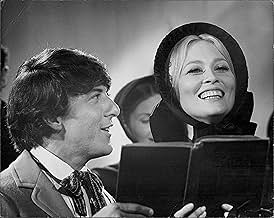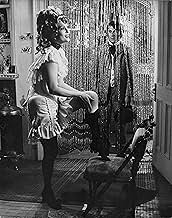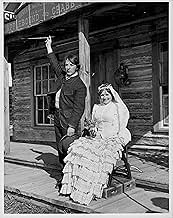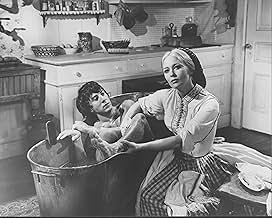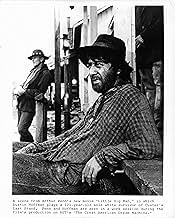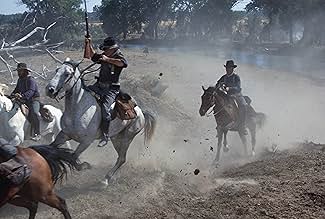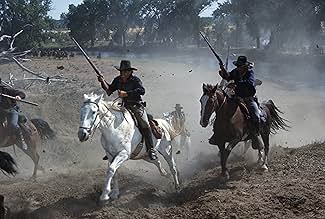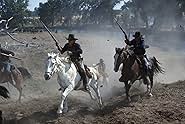L'histoire d'un visage pâle partagé entre ses origines et sa famille d'adoption, indienne.L'histoire d'un visage pâle partagé entre ses origines et sa famille d'adoption, indienne.L'histoire d'un visage pâle partagé entre ses origines et sa famille d'adoption, indienne.
- Director
- Writers
- Stars
- Nommé pour 1 oscar
- 5 victoires et 11 nominations au total
- Sunshine
- (as Amy Eccles)
- Caroline
- (as Carol Androsky)
- Lieutenant
- (as Jess Vint)
Avis en vedette
The book is more human, giving each character Jack encounters three dimensions and avoiding the trap of rendering any of them either all good or all bad. The moment in Penn's film that best evoke the book is the scene where Custer catches Jack approaching to kill him and instead of killing his stalker, lets him go. Throughout this wonderful novel, characters do unexpected things that seem at first to be totally out of character, and thus serve to remind us of the complexity of human beings. As someone suggests here, the film may intend to say something about the random, unpredictable nature of the universe. The novel does something a lot more difficult and down-to-earth: It reminds us that it takes a lifetime to know even a few of our fellow humans. And especially for Jack, who has to navigate two distinct cultures.
So if you liked the movie, by all means read the book. You'll finish it loving this tall tale way more.
Well, this was destined to be a headliner--Arthur Penn directing (after "Bonnie and Clyde") and Dustin Hoffman (after "The Graduate" and "Midnight Cowboy"). And it's a comedy in the wackiest way. Hoffman is a survivor from Little Big Horn (Custer's Last Stand) and this is an invented life up to that point, told from memory to man with a tape recorder at the age of 123.
And the old (old!) Hoffman is pretty terrific, mostly in the narration, but including some pretty caked on make-up, too. Most of the movie is a young Hoffman as both Indian and White Man (alternating, depending on how he gets miraculously saved from one disaster after another). It's a farce, yes, but there are overtones of tragedy throughout (the annihilation of a race can only be so funny for so long) and there are some truly violent scenes, mostly of Indians being slaughtered by the Army.
It might help to know this is a metaphor of sorts about the brutality of the Army in Vietnam, which was raging at the time. It does make it all less frivolous. But it's also just fine as a crazy retelling of the last great famous Indian War, and the events (more or less) leading up to it. Hoffman is terrific in his usual way, and the support around him funny, especially the old Indian Chief, played by Chief Dan George. The two other big stars appear only briefly, Faye Dunaway in a couple scenes, and Martin Balsam in one. It's really Hoffman's film, and Penn's, too, with a grand and complex range of scenes inside and out, night and day, city and wide open country.
It didn't strike me as a brilliant film, or even as funny as it could have been, but it's endlessly engaging and there are some witty and funny moments sprinkled all through. It is long, and I might not call it slow even though it feels like it drags here and there, for sure.
Poor Hoffman just can't find himself a niche in the world of the west either with white men or with Indians. He finds himself in the Dakota Territory of the 1870s and makes the acquaintance of such people as Wild Bill Hickok and George Armstrong Custer, a couple of old west legends who met famous premature deaths in the same year of 1876. And of course some lesser people in mostly low places.
Hoffman gets some great support from people like Martin Balsam as a medicine show conman whom he spends some time with and Faye Dunaway as the widow woman who takes the orphan Hoffman in and explains and demonstrates the facts of life. Jeff Corey plays Wild Bill Hickok who explains to Hoffman he really doesn't have the right stuff to be a gunfighter.
Best of all is Richard Mulligan as the controversial General George Armstrong Custer whose ambitions for military glory led to the massacre at Little Big Horn. Mulligan is ambitious and will not take good advice. Watching Little Big Man in the scenes with Mulligan it was like looking at Donald Trump campaigning for president. Just like The Donald, Mulligan will not listen to anyone other than himself. In fact you mostly have to use reverse psychology to get Mulligan to do things your way. Hoffman may be a misfit, not unlike his character in The Graduate, but he learns to play Mulligan like a piccolo.
Little Big Man is a different and entertaining look at the old west and Hoffman is superb. But the one to really watch in this is Richard Mulligan. He steals the film in whatever scene he's in.
Le saviez-vous
- AnecdotesThe role of Old Lodge Skins was initially offered to Marlon Brando, who turned it down. Other sources claim Arthur Penn's first choice for the role was Sir Laurence Olivier. When that didn't work out, Richard Boone was slated for the role. When Boone backed out at the last minute, Chief Dan George was given the part and earned an Oscar nomination.
- GaffesThe wires forcing a horse to fall are visible in the final battle scene, just before Custer exclaims "Fools! They're shooting their own horses!"
- Citations
Jack Crabb: Do you hate them? Do you hate the White man now?
Old Lodge Skins: Do you see this fine thing? Do you admire the humanity of it? Because the human beings, my son, they believe everything is alive. Not only man and animals. But also water, earth, stone. And also the things from them... like that hair. The man from whom this hair came, he's bald on the other side, because I now own his scalp! That is the way things are. But the white man, they believe EVERYTHING is dead. Stone, earth, animals. And people! Even their own people! If things keep trying to live, white man will rub them out. That is the difference.
- ConnexionsFeatured in Arthur Penn: The Director (1970)
- Bandes originalesBringing In the Sheaves
(1880) (uncredited)
Music by George A. Minor (1880)
Hymn by Knowles Shaw (1874)
Sung a cappella by Faye Dunaway
Meilleurs choix
- How long is Little Big Man?Propulsé par Alexa
Détails
- Date de sortie
- Pays d’origine
- Langue
- Aussi connu sous le nom de
- Little Big Man
- Lieux de tournage
- sociétés de production
- Consultez plus de crédits d'entreprise sur IMDbPro
Box-office
- Budget
- 7 000 000 $ US (estimation)
- Brut – États-Unis et Canada
- 31 559 552 $ US
- Brut – à l'échelle mondiale
- 31 559 552 $ US

